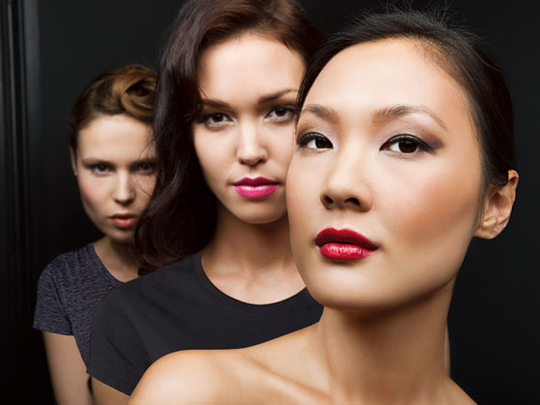
1. Lip balm makes your lips drier
Mostly Fact “Lips contain no sebaceous glands, so are more prone to drying out,” says top Harley Street cosmetic dermatologist Sam Bunting. But while most lip-balm addicts say their habit is born of the fact that the more they use their balm, the more their lips seem to need it to feel soft and moisturised, most ‘addictions’ are due to the fact that wearers simply become used to the glossy feeling on their lips. However, it is worth noting that some ingredients in lip balm, like camphor, menthol, phenol and alcohol can lead to further irritation and dryness – which isn’t great when you consider that balm is meant to keep your lips feeling soothed and comfortable. “The key is to look at the ingredients,” says Bunting, who suggests opting for an all-lanolin or beeswax-based balm. And the biggest favour you can do for your lips? Drink more water. Dry and chapped lips are a sign of significant dehydration, so up your water intake, and you may not even need to rely on lip balm in the first place.
2. Shaving makes hair grow back quicker
False It’s the speediest and cheapest way of getting rid of hair short term, so you’ll be pleased to hear shaving has absolutely no effect on hair growth rate. However, after shaving, it grows back at the thicker part of the hair and with a blunt edge, as the razor cuts it straight across the shaft – unlike waxing, which removes hair at the root so it grows back with a softer texture. Because of this, shaving stubble feels stiffer and can appear thicker.
3. If you don’t wash your hair, it will eventually clean itself
False Aside from being pretty disgusting, this myth is, according to trichologist Philip Kingsley, “utter nonsense.” The expert, who looks after the manes of some of the world’s most famous heads, expains, “A clean scalp and hair equals a healthier scalp and hair”. He adds, “You should wash and condition your hair regularly. When left for just three to four days, the scalp can become flaky, itchy and uncomfortable, with a mild tenderness, while the hair itself will become dull and lank.”
4. Crossing your legs can cause varicose veins
False Well-poised ladies, rejoice! Because maintaining your elegance when sitting has absolutely nothing to do with getting varicose veins. “Crossing your legs does put some pressure on your veins, but you would have to keep them crossed 12 hours a day for months at a time to see an effect on the formation of varicose veins,” says New York dermatologist Dr Diane Berson. “It’s pretty much down to genetics – if you’ve got the gene, you’re likely to have them at some stage. Otherwise, pregnancy, and spending long periods of time on your feet are the biggest cause.”
5. Having your hair cut makes it grow faster
False “Hair grows at a constant rate, usually about half an inch a month, even if the ends are damaged,” says Dubai-based Salon Ink’s Kelly Cyndrowski. “Having your hair cut regularly will make it look thicker and stronger, making it appear longer, but won’t make a difference to how long it truly is.”
6. Pluck a grey hair and seven more will appear in its place
False Thankfully, this one is completely untrue, since it’s physically impossible to increase the number of follicles you have on your head as a result of plucking out a hair of any colour. “The myth probably originated because when hair starts greying, each follicle containing the hair gradually ceases to form colour granules, so
when one grey hair is plucked, the follicle next to it is already beginning to produce a grey hair,” says trichologist Kingsley.
7. You don’t need to wear sunscreen every day if there’s already SPF in your foundation
False “Make-up does not provide enough SPF coverage to protect your skin from harmful UVA and UVB rays,” says best-selling author and dermatologist Leslie Baumann. “To get sufficient sun protection, you need 2mg of sunscreen per square centimetre of skin, which – based on the concentration of sunscreen in foundation – works out to seven times as much as you would normally wear.” In addition to the amounts you’d need to apply, the pigment in make-up actually breaks down chemical sunscreen much as the sun itself does, which theoretically means you should reapply your SPF foundation every two hours. And while SPF-enriched make-up isn’t useless, because of the amount you’d need to get any benefit from it, you should never rely on it exclusively to protect your skin. In fact, in the US FDA rules may soon require that foundations remove those SPF claims altogether, because they give a false sense of security. Bottom line? Wear a minimum of an SPF30 broad-spectrum sunscreen under your foundation every day.
8. Not getting enough sleep causes under-eye circles
False Sleep deprivation can lead to many things – memory lapses, moodiness and weight gain amongst them. But you can thank your parents for the shadows under your eyes. Dark under-eye circles are the result of the concentration of veins beneath the very thin skin in that area, which are determined by genetics and won’t change with more or less sleep. However, frequent late nights may cause fluid retention under your eyes, and it’s that puffiness that can draw attention to existing darkness. If your dark circles are the result of dark pigment cells, topical lightening creams (containing hydroquinone, kojic acid, glucosamine or glycolic acid) might work, says New York based dermatologist, Dr Francesca J Fusco.
9. Putting toothpaste on a spot before bed will make it disappear by morning
False “Toothpaste has its emergency benefits for helping to dry out a spot, but it won’t get rid of it,” says Maria McKeever, head of treatment development at Clarins. “Toothpaste removes dirt from your teeth and kills bacteria – which is perfect for fighting spots – but most are made with strong anti-bacterial properties, which sometimes bleach, and can cause dry skin and irritation.” Better to dab on a little tea-tree oil, or a cream that contains benzoyl peroxide or salicylic acid if you’re battling breakouts on a regular basis.
10. Dying your hair too often will make it fall out
False While frequent hair colouring and bleaching can cause extensive damage and hair breakage throughout the lengths of hair, “it rarely causes hair to actually fall out from the root,” says Kingsley. “But if the hair is very dry and brittle, which it may well be due to excessive colouring and style changes, hair can break at scalp level, mimicking the appearance of hair shedding from the follicle. More damaging than colour, however, are hair extensions, which have the capacity to pull hair out from the follicle, which can eventually lead to bald patches with continued use.”
11. Sleeping on your back can prevent wrinkles
True The American Academy of Dermatology cautions that sleeping in certain positions night after night leads to deep-set ‘sleep lines’ – wrinkles that become etched into the surface of the skin and don’t disappear once you’re out of bed. According to the research, sleeping on your side increases wrinkles on cheeks and chin, while sleeping face-down gives you a furrowed brow. The best way to reduce wrinkle formation? Sleep on your back. “The way you sleep does affect wrinkles,” says author of Skin Rules: Trade Secrets From A Top New York Dermatologist Debra Jaliman.
“If you are crunching your face against a pillow night after night, it’s inevitable these kind of wrinkles will form.” But if sleeping on your back is impossible, there are ways to minimise the impact on your skin. “Silk or satin pillowcases rather than regular cotton ones allow your face to slide against the fabric so it doesn’t squash up against it, and no lines are formed,” says Jaliman. “Or invest in a beauty sleep pillow, which is made with special foam and specially shaped to alleviate pressure.”
12. Eating chocolate gives you spots
False Chocolate may not be great for the waistline, but eating it isn’t going to give you spots. “Chocolate per se will not make you break out,” says author of Heal Your Skin: The Breakthrough Plan for Renewal Dr Ava Shamban. “In fact, there is little evidence that any specific fatty foods will cause acne, but we do know that a high-sugar diet can increase sebum production and promote inflammatory responses in the body, which can aggravate acne.” More significant are hormonal changes that occur within the body, which have the greatest impact on sebum production, and whether or not your parents have oily skin. Because if your folks suffer from acne, it’s likely you will too, and it’ll be nothing to do with whether you ate a family-sized bar of Dairy Milk or not.












